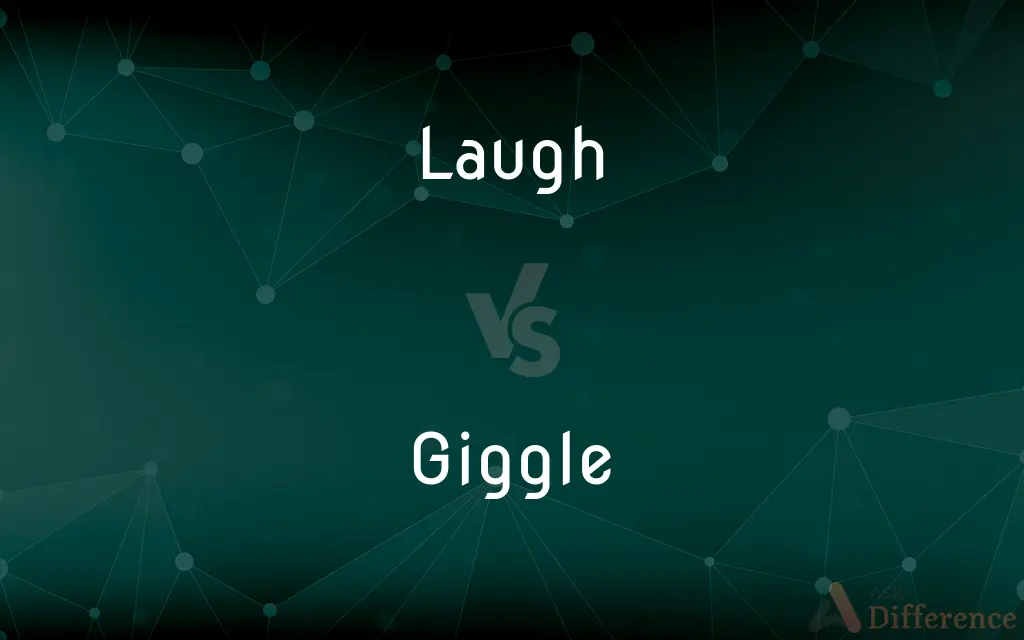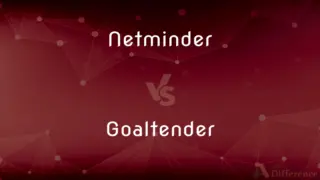Laugh vs. Giggle — What's the Difference?
By Maham Liaqat & Urooj Arif — Updated on March 7, 2024
Laughing is a louder, more expressive response to humor or joy, involving a range of sounds and body movements, while giggling is a quieter, more controlled laughter, often reflecting amusement or nervousness.

Difference Between Laugh and Giggle
Table of Contents
ADVERTISEMENT
Key Differences
Laughing is a spontaneous vocal response that can vary greatly in volume and intensity, typically reflecting joy, amusement, or even relief. It often involves a series of loud, vocal bursts and can be accompanied by physical movements like slapping knees or doubling over. On the other hand, a giggle is a lighter form of laughter, characterized by quieter, repeated short sounds, and is often a more restrained and subtle expression of amusement or sometimes nervousness.
Laughter can be induced by a variety of stimuli, from jokes and humorous situations to tickling or social interactions, serving as a universal sign of happiness and a social bonding mechanism. In contrast, giggling might be more common in situations requiring subtlety or discretion, such as a quiet classroom or a tense social setting, where outright laughter might be deemed inappropriate.
In terms of social context, laughing is a powerful tool for signaling agreement, shared understanding, or acceptance within a group, often leading to a contagious effect among participants. Giggles, however, can convey a range of additional nuances, including shyness, embarrassment, or flirtation, and may not always trigger a similar group response.
Physiologically, laughing engages a wide array of facial muscles, respiratory changes, and even endorphin release, contributing to stress reduction and a sense of well-being. Giggling, while also involving facial muscles and potentially endorphins, is usually less intense and might not produce the same level of physiological benefits as full laughter.
Culturally, laughing is universally recognized and valued as an expression of joy and humor across different societies, often transcending language barriers. Giggling, though also widespread, may carry different connotations depending on cultural norms and contexts, sometimes being viewed as a sign of politeness, coyness, or even discomfort.
ADVERTISEMENT
Comparison Chart
Volume
Often loud
Usually quiet
Expression
Broad, ranging from chuckles to guffaws
Subtle, restrained
Inducement
Humor, joy, social interaction
Amusement, nervousness, discretion
Social Context
Universal sign of happiness, bonds groups
Can convey shyness, embarrassment
Physiological Response
Engages many facial muscles, releases endorphins
Less intense, fewer physiological benefits
Cultural Perception
Universally recognized and appreciated
Connotations vary by culture
Compare with Definitions
Laugh
It serves as a social bonding tool, reinforcing group cohesion.
Their shared laughter over the old story brought them closer.
Giggle
It can express a range of emotions, from joy to discomfort.
His awkward compliment drew a nervous giggle from her.
Laugh
Laughing is a vocal expression of amusement or joy, often loud and uninhibited.
The comedian's joke made the audience erupt in laughter.
Giggle
Giggling is often seen in contexts requiring subtlety or discretion.
The students exchanged giggles over their inside joke during class.
Laugh
Laughter can be therapeutic, reducing stress and enhancing mood.
A good laugh with friends is the best stress reliever.
Giggle
A giggle is a soft, somewhat restrained form of laughter, reflecting mild amusement or nervousness.
She couldn't help but giggle at the playful puppy's antics.
Laugh
Different types of laughter include chuckles, belly laughs, and guffaws, each varying in intensity.
His hilarious remark caused a roomful of hearty belly laughs.
Giggle
In some cultures, giggling is a polite response to certain social situations.
Her polite giggles masked her true feelings about the awkward situation.
Laugh
Laughter is contagious, often spreading through groups.
Her laughter was so infectious that soon everyone was laughing along.
Giggle
Giggles are characterized by short, light bursts of laughter.
The room was filled with the sound of children's giggles.
Laugh
To express certain emotions, especially mirth or delight, by a series of spontaneous, usually unarticulated sounds often accompanied by corresponding facial and bodily movements.
Giggle
To laugh with repeated short, spasmodic sounds.
Laugh
To show or feel amusement or good humor
An experience we would laugh about later on.
Giggle
To utter while giggling.
Laugh
To feel or express derision or contempt; mock
I had to laugh when I saw who my opponent was.
Giggle
A short, spasmodic laugh.
Laugh
To feel a triumphant or exultant sense of well-being
You won't be laughing when the truth comes out.
Giggle
To laugh gently in a playful, nervous, or affected manner.
The jokes had them giggling like little girls all evening.
Laugh
To produce sounds resembling laughter
Parrots laughing and chattering in the trees.
Giggle
A high-pitched, silly laugh.
Laugh
To affect or influence by laughter
Laughed the speaker off the stage.
Laughed the proposal down.
Giggle
(informal) Fun; an amusing episode.
We put itching powder down his shirt for giggles.
The women thought it would be quite a giggle to have a strippergram at the bride's hen party.
Laugh
To say with a laugh
He laughed his delight at the victory.
Giggle
To laugh with short catches of the breath or voice; to laugh in a light, affected, or silly manner; to titter with childish levity.
Giggling and laughing with all their mightAt the piteous hap of the fairy wight.
Laugh
The act of laughing.
Giggle
A kind of laugh, with short catches of the voice or breath; a light, silly laugh.
Laugh
The sound of laughing; laughter.
Giggle
A foolish or nervous laugh
Laugh
(Informal) Something amusing, absurd, or contemptible; a joke
The solution they recommended was a laugh.
Giggle
Laugh nervously;
The girls giggled when the rock star came into the classroom
Laugh
Often laughs(Informal) Fun; amusement
Went along just for laughs.
Laugh
An expression of mirth particular to the human species; the sound heard in laughing; laughter.
His deep laughs boomed through the room.
Laugh
Something that provokes mirth or scorn.
Your new hat's an absolute laugh, dude.
Laugh
A fun person.
Laugh
(intransitive) To show mirth, satisfaction, or derision, by peculiar movement of the muscles of the face, particularly of the mouth, causing a lighting up of the face and eyes, and usually accompanied by the emission of explosive or chuckling sounds from the chest and throat; to indulge in laughter.
There were many laughing children running on the school grounds.
Laugh
To be or appear cheerful, pleasant, mirthful, lively, or brilliant; to sparkle; to sport.
Laugh
To make an object of laughter or ridicule; to make fun of; to deride; to mock.
Don't laugh at my new hat, man!
Laugh
(transitive) To affect or influence by means of laughter or ridicule.
Laugh
(transitive) To express by, or utter with, laughter.
Laugh
To show mirth, satisfaction, or derision, by peculiar movement of the muscles of the face, particularly of the mouth, causing a lighting up of the face and eyes, and usually accompanied by the emission of explosive or chuckling sounds from the chest and throat; to indulge in laughter.
Queen Hecuba laughed that her eyes ran o'er.
He laugheth that winneth.
Laugh
Fig.: To be or appear gay, cheerful, pleasant, mirthful, lively, or brilliant; to sparkle; to sport.
Then laughs the childish year, with flowerets crowned.
In Folly's cup still laughs the bubble Joy.
No wit to flatter left of all his store,No fool to laugh at, which he valued more.
Laugh
To express by, or utter with, laughter; - with out.
From his deep chest laughs out a loud applause.
Laugh
The sound of laughing
Laugh
A facial expression characteristic of a person laughing;
His face wrinkled in a silent laugh of derision
Laugh
A humorous anecdote or remark intended to provoke laughter;
He told a very funny joke
He knows a million gags
Thanks for the laugh
He laughed unpleasantly at hisown jest
Even a schoolboy's jape is supposed to have some ascertainable point
Laugh
Produce laughter
Common Curiosities
Why do people giggle in nervous situations?
Giggling in nervous situations can be a coping mechanism, helping to relieve tension and convey a sense of light-heartedness.
Is giggling a type of laughter?
Yes, giggling is a softer, more subdued form of laughter, often associated with amusement or nervousness.
Do animals laugh?
Some animals, particularly primates, have vocalizations that resemble laughter, usually during play or social bonding activities.
Do different cultures laugh differently?
While laughter is universal, the triggers, frequency, and social acceptability of laughter can vary significantly across cultures.
Is it possible to laugh without a reason?
Yes, laughter can sometimes occur without a clear reason, often as a result of social cues or certain neurological conditions.
What is nervous laughter?
Nervous laughter is laughter that occurs in response to anxiety, discomfort, or confusion, rather than genuine amusement.
Can giggling be contagious?
While giggling can be contagious in some contexts, it generally doesn't spread as easily as more robust laughter.
Can laughter improve physical health?
Yes, laughter can improve physical health by reducing stress, boosting the immune system, and even providing a mild workout.
Can laughter be involuntary?
Yes, laughter can often be an involuntary response to stimuli that the brain interprets as humorous or joyful.
How does laughter benefit social interactions?
Laughter promotes bonding, defuses tension, and signals shared understanding and acceptance within groups.
Why do some people giggle more than others?
Individual differences in giggling can be attributed to personality, cultural background, social comfort levels, and personal humor styles.
What triggers laughter?
Laughter is typically triggered by humor, joy, social interactions, or even certain physiological stimuli like tickling.
How can laughter be encouraged in daily life?
Incorporating humor, spending time with funny people, and engaging in fun activities can encourage laughter in daily life.
Is laughter truly the best medicine?
While laughter has many health benefits, including stress reduction and an enhanced sense of well-being, it is not a substitute for medical treatment.
Is it normal to laugh at inappropriate times?
While it can be considered socially awkward, laughing at inappropriate times can be an involuntary reaction to stress or confusion.
Share Your Discovery

Previous Comparison
Netminder vs. Goaltender
Next Comparison
Waify vs. ThinAuthor Spotlight
Written by
Maham LiaqatCo-written by
Urooj ArifUrooj is a skilled content writer at Ask Difference, known for her exceptional ability to simplify complex topics into engaging and informative content. With a passion for research and a flair for clear, concise writing, she consistently delivers articles that resonate with our diverse audience.
















































